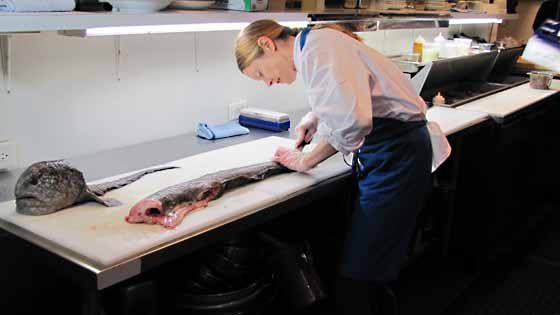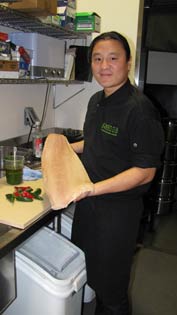“Overfishing—catching fish faster than they can reproduce—is an urgent and devastating issue, and may be the single biggest threat to ocean ecosystems… The global fishing fleet is operating at 2.5 times the sustainable level—there are simply too many boats chasing a dwindling number of fish.”
—Monterey Bay Aquarium Seafood Watch
Trash Fish Dinner Promotes Consumer Awareness Toward Eating Less Threatened Species of Fish
4 top chefs team up as part of a national Chefs Collaborative fundraising effort to raise public awareness of overfishing, and create demand for alternative fish species that are not presently at risk.
Fueled by heightened consumer demand, the larger, more popular fish are being overfished. The hope is, by creating desirable alternatives for less threatened “trash fish” (and other fish) lower on the food chain, this will help restore a more sustainable balance to fish population levels.
Overfishing is a complex problem. It involves not only the over-harvesting of certain popular fish species; fish populations are also being threatened by a host of interrelated issues, including:
- The type of fishing methods used: of particular concern, the large trawler vessels that harvest vast quantities of fish and bycatch (non-targeted fish caught unintentionally by commercial fishermen). They are also prone to damaging fragile, native marine environments diminishing fish habitat areas.
- Illegal fishing that undermines the necessary established quotas to protect fish populations from becoming endangered.
- lack of cohesive local, national, and international regulatory enforcement and standards for establishing sustainable harvest levels.
- climate change that continues to warm ocean temperatures, and increase ocean acidification levels, both effects threaten fish populations.

Below are the 4 Portland (Oregon) chefs featured in the video, and the dishes they prepared for their local Trash Fish Dinner:
- Jin Soo Yang
Bamboo Sushi
Thai-cured Ivory King Salmon with Crisps - Kelly Myers
XICO
Wolf Eel Mole - Kevin Gibson
Davenport
Sauteed Sanddabs with Celeriac & Meyer Lemon Puree - Cathy Whims
Nostrana
Roman (Pacific) Skate, Romanesco Broccoli & Pasta Soup
Video Transcript:
Chef Piper Davis: Today we’re hosting a trash fish supper. It’s a fundraiser for an organization that is near and dear to many of our hearts here called the Chefs Collaborative.
Chef Jin Soo Yang walks in with cooler: Where would be the best place to put this thing?
Davis: And we are exploring some alternative species to put on the table.
It’s jokingly referred to ‘trash fish’. I mean we use that sort of as a you know, an edgy, catchy name. I think, I think, um, I think they are fish that you traditionally don’t find on American tables.
So we started with the supply.
We went to Lyf Gildersleeve at Flying Fish Sustainable Seafood. We went to the folks at Port Orford. We talked to some of our sponsors, Monterey Bay and Environmental Defense Fund and we said, ‘What is, what is under appreciated? What is available this time a year? What can we get?’ We gave the chefs the list and they chose.
Yang: You see right here? It’s called the bloodline and that’s really, a lot of people consider that very bitter, so I like to just remove that whole thing.
Davis: We are featuring four species, um, the Ivory King salmon, where the white Ivory Kings are often, um, sold at a much cheaper price and/or not sold at all because people don’t associate ‘white’ with salmon.
Yang: That’s why it’s considered it’s a trash fish ’cause a lot of people would see that and it’s different so they wouldn’t want it so they would just throw it back and just get rid of it.
Chef Kelly Myers pulls out Wolf Eel: It’s just a tiny little bit frozen on the tail where the smaller part is.
Davis: For kind of the ‘ooh’ factor and crazy factor we’re featuring a Wolf Eel which is, again, something that people don’t generally go out fishing for, but , um, the good practice of hook-and-line trawl fishing they come up. And so if you have a fish on the hook it’s better to eat it and use it, feature it on a menu rather than turn it into bait or waste.
Myers: We’re looking at using more fish that are bycatch so that we’re not just overfishing one or two species that everybody likes. For example, in this part of the world everybody really loves halibut and salmon, but we kind of need to take some of the pressure off of those species and start looking at some other species.
People call these Wolf Eel but they’re not actually an eel, they’re a fish. Unlike eel, eel have really oily meat, they’re meat is not oily, it’s cleaner and lighter tasting.
Davis: We are also featuring sand dabs which are an-an example of a plentiful species and probably under appreciated by the American public because they’re small and boney but they are delicious.
And then the final offering is going to be Skate wing which again is not a completely unknown fish but is another example of bycatch.
Chef Cathy Whims: This is Pacific Skate.
I’m going to make a very kind of ancient Roman dish that was often served on Fridays or the Holy days when the Catholic Church didn’t let people eat meat. And it was also— Skate was considered kind of a dish of the poor people in Rome. It just wasn’t an expensive fish.
I just got back from Italy where they revere like all kinds of fish, both little fish and big fish and freshwater fish and eels and all kinds of things that we ignore here as Americans. And I just would like for us to have the appreciation for those fishes and have the opportunity to be able to buy them.
Davis: The Collaborative is a national network of chefs who are sort of food activists trying to change our food system using their purchasing power in their own kitchens to demand more sustainable supplies of more sustainable ingredients. We believe that chefs have a lot of power in society right now in terms of influencing buying habits of the greater culinary community and that by changing our own practices, changing our own menus that we hopefully can change the minds of-of the greater population and work to change this broken food system.
This is sort of the beginning of what we’re trying to do is take on an issue, have dinners around the country that highlight that issue and then we’ll move on to another one.
Next year look for us to be doing a dinner around the use of antibiotics in factory farming. That’s one of our main-main goals right now is to eliminate that use. We’re really hot on it.
Cathy had a vision of a, of a Sunday afternoon Italian supper. So we will serve family style. We will have a brief time to talk about the issues.
And then we also have filled our program with information about each species and we really are going to encourage guests to interact with one another around the issues that are on the table.
There’s not a right or a wrong. There are very few issues in sustainable food are black and white. It’s a continuum and we just hope that everybody walks away with kind of one change that they might think about making or-or asking for in their food system, in their personal food system.
Most of the videos featured on Cooking Up a Story were produced, filmed, and edited by Rebecca Gerendasy. Fred Gerendasy contributed as a writer to many of the posts and occasionally as the interviewer. Visit Rebecca Gerendasy Clay – Art and Fred Gerendasy Photography to see their current work.

